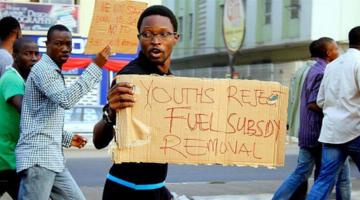Ama Ata Aidoo lands a knock-out blow to white neocolonial anti-African revisionism.
If it is true, as Frantz Fanon told us, that one strategy of colonialism was to degrade, dismiss, and destroy the history and culture of the colonized, it is also true that neocolonialism operates in a similar fashion on the history and culture of anti-colonial struggle. It is no wonder, then, that so many revolutionary figures, if they have not been murdered in cold blood by the colonial state, have been assassinated by the neocolonial imagination: their personalities have been debased, their ideas have been scorned, and their radical political movements have been hijacked. Indeed, the contemporary memory of anticolonial struggle is such that a segment of the younger generation who grew up under neocolonialism and neoliberalism can claim that life was better under colonialism. While this is a sad indictment of the current order, it also betrays a staggering ignorance of colonialism itself.
But can you blame the youth? The ideological work of neocolonialism has been relentless and comprehensive, while the reactionary, counter-revolutionary revisionists, some white, some Black, are well paid and ubiquitous.
Thus, Transition, the African journal of politics and letters, began an anti-Nkrumah campaign soon after the 1966 coup that removed Kwame Nkrumah, Ghana’s first president, from power. Founded in 1961 in Kampala by Rajat Neogy, Transition was funded by the CIA – the same CIA that was behind the coup. The opening salvo in Transition’s Nkrumah revisionism was fired by Kenyan scholar Ali Mazrui, in an essay titled “Nkrumah: Leninist Czar.” The essay is snide and silly, historically shaky and theoretically suspect. Mazrui is so obviously drunk on anti-Communism that he is blinded to the broader context of the Cold War and western imperialism. He somehow casts Nkrumah as both a Bolshevik ideologue and a neo-Czarist “royalist.” He also mimics the racist historiography of the US Civil War by arguing that Nkrumah’s alleged post-Independence decadence, ostentation, and corruption mirrored that of African Americans after emancipation. Mazrui concludes that, “Nkrumah fell short of becoming a great Ghanaian.”
In the following issue of Transition, journalist Russell Warren Howe piled on, extending the anti-Nkrumahism in a commentary titled “Did Nkrumah Favour Pan-Africanism?” Howe was a white foreign correspondent who covered Africa for the Washington Post and other news outlets. No Basil Davidson, Howe was perhaps typical of the white foreign correspondent – condescending and paternalistic. For Howe, Africa was exotic and tragic and the prospects for African self-government were not only bleak, but also a source of white mirth. Howe’s terrible writings on George Padmore, for instance, have contributed much to the historical misinformation passing as truth about the Trinidadian Pan-Africanist. In any case, Howe’s short answer to his own question, “Did Nkrumah Favour Pan-Africanism?” was an unequivocal “No.” According to Howe, Nkrumah’s foreign policy, guided by paranoia and narcissism, worked to sabotage any projects of African unity. For Howe, Nkrumah’s domestic policy was even worse. Following Mazuri’s lead, he wrote that “Ghana under Nkrumah was a fairly typical fascist state.”
Responses to Mazrui’s and Howe’s articles were blistering. Among the spate of letters denouncing both men was a brilliantly caustic take-down of Howe by Ama Ata Aidoo, the Ghanaian novelist, poet, playwright, politician, and academic. Aidoo (March 1942 - 31 May 2023), absolutely skewers Howe. She provides a devastating counter-punch to Mazrui’s and Howe’s anti-African revisionism– and to the counterrevolutionary ideological pressure of neocolonialism that still dominates the African world. We need more voices like Aidoo’s today. We reprint her letter below.
Thank you, Mr. Howe
Ama Ata Aidoo
Dear Sir,
On behalf of Africans dead, alive and unborn, “free” and enslaved, I would like you and your entire readership to join me in saying “Thank you” to our big white father [Russell Warren] Howe for an extremely illuminating and rather fresh analysis of Kwame Nkrumah (Transition 27, p. 13). Our ignorance was extreme. For instance, we knew that:
He was squeamish at the kind of unabashed licking of pale Western feet which some of our leaders find so attractive and whenever possible he denounced this and the companion sale of the future of Africa and its people; we did not know he was against Pan-Africanism;
He allowed the introduction of the Prevent Detention Bill, which couched in different words, is in operation under many respected governments: we did not know he was worse than Hitler (being black and communist);
He took exception to the somewhat patronising and always dangerous manner certain foreign correspondents handled news items from and about Africa: it interests us that such an attitude has provoked a comparison of him with Dr. Henrik Verwoerd;
He permitted a personality cult to developed round him and we are grateful to learn this was a symptom of psychosis;
He has always been extremely unpopular with all of us, especially us, the objective intellectuals and disinterested journalists; nonetheless, we are slightly surprised to learn he is being reduced to a “card.”
Mr. Howe’s efforts are all the more commendable since he happens to be a citizen of the richest and most democratic country in the world:
Whose President is waging history’s bloodiest war against a very tiny and poor country;
Where millions of children are still under schooled, underfed and are forced to share their beds with rats;
Where George Rockwell, chairman of the American Nazi Party, is a recognized public spokesman;
And where the Ku Klux Klan flies the national flag in broad daylight.
Mr. Howe is so kind that he has abandoned these pressing domestic problems to waste time, energy and genius on the ex-President of a small and insignificant “negro” country. We have many big white fathers like him who are constantly telling us what is good for us and what is not, what we must do and what we must not, but he is really priceless because he is possessed of that rare genius which can equate socialism and fascism and stretch out the errors in a foreign government’s tactics into major cries while behaving as though the crimes his own government is busy committing are acts of mercy. What is more, he seems adept at insulting foreign personalities whose political views he has reason to object to. He certainly can teach African intellectuals and journalists a lesson or two.
To show Mr. Howe that we have heard what he has recently told us, we are going to send Kwame Knrumah to Bellevue (a hospital for the criminally insane in New York) as soon as possible. We also promise that any time we want to publish the names of our “‘great’ Africans,” we shall submit the lists to him for our approval first. We further register our appreciation of his obvious concern for the success of Pan-Africanism and, therefore, our well-being.
We shall not forget what Mr. Howe and his sort are accomplishing on our behalf.
Yours sincerely,
Ama Ata Aidoo
P.S. Incidentally, we are also grateful to our own Professor Ali Mazuri and all the other objective and non-partisan African intellectuals and journalists who make the writing and publication of papers like Mr. Howe’s possible.
Stanford,
California, U.S.A.
Source: Transition, No. 29 (Feb. - Mar., 1967), pp. 5-8



















